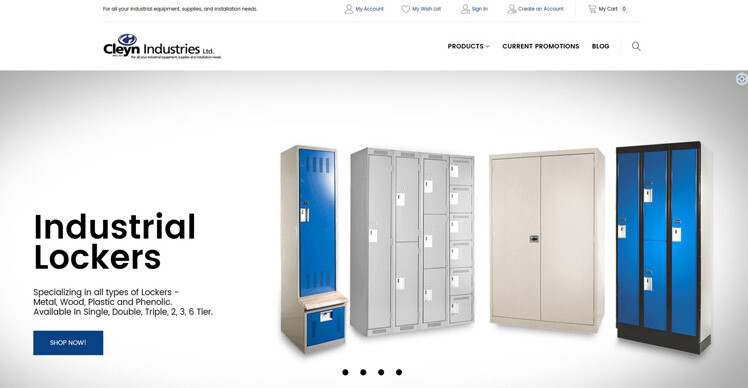eCommerce AI | Web Apps | AR/VR Software – ECA Tech
- Home
- Magento for B2B Companies: Tailoring Your Store
Magento for B2B Companies: Tailoring Your Store

September 1, 2024 - Technology
In the fast-paced world of B2B commerce, having a powerful and flexible eCommerce platform is crucial for business success. A top choice for many businesses of all sizes, Magento has established itself as a reliable and innovative eCommerce solution.
With its advanced capabilities and customizable options, Magento empowers B2B businesses to create unique and personalized online experiences for their customers. Magento serves as a powerful tool for B2B companies seeking to stay ahead in today’s competitive market. Magento, a leading eCommerce platform, offers a suite of features tailored to meet the specific needs of B2B companies.
With a focus on functionality and user experience, Magento ensures that B2B businesses can effectively showcase their products and services. From advanced product catalog management to seamless integration with accounting systems, Magento provides a comprehensive solution for B2B eCommerce needs. By offering a range of integrations and extensions, Magento enables B2B companies to customize their eCommerce operations to fit their unique requirements. Its robust, scalable nature makes it an ideal choice for businesses looking to enhance their online presence and streamline their operations.
In this article, we’ll explore the best six ways B2B companies can leverage Magento to tailor their store for optimal performance and efficiency. Through effective use of Magento’s tools and features, B2B companies can enhance customer engagement and loyalty, ultimately driving sales and growth.
Let’s dive into the key strategies that B2B companies can implement to maximize the potential of Magento for their online stores. By harnessing the full potential of Magento, B2B companies can position themselves as industry leaders and drive long-term success. Get ready to discover how Magento can revolutionize the way B2B companies conduct business online.
- Robust
- Scalable
- Optimal
- Streamline Operations
6 Ways b2b Companies can leverage magento
1. Customizable User Experiences
Personalized Account Management
Magento’s B2B capabilities are grounded in its ability to provide personalized user experiences. With Magento, you can create detailed customer profiles, enabling you to tailor experiences based on individual client needs. This personalization extends to account management, where customers can manage multiple users under one account, set custom permissions, and view detailed order histories.
For instance, companies can assign roles and permissions within a single account, allowing different departments or team members to access specific functionalities or data. This level of customization ensures that users only see the information relevant to their role, streamlining the purchasing process and reducing the potential for errors.
Dynamic Pricing and Catalogs
Magento’s flexible pricing and catalog management features allow businesses to offer customized pricing structures based on customer groups. You can create tiered pricing, special discounts, and promotions tailored to different customer segments. This is particularly useful for B2B companies that often deal with bulk orders and long-term contracts.
By implementing dynamic pricing rules, businesses can automate the application of discounts based on order volume, customer history, or other criteria. Additionally, Magento allows you to customize catalogs for different customer groups, ensuring that each client only sees products relevant to their business needs.
2. Advanced Order Management
Streamlined Ordering Process
Efficient order management is critical for B2B companies, where orders can be large and complex. Magento offers advanced order management features that streamline the ordering process, making it easier for both buyers and sellers to handle large transactions.
Magento’s order management system includes features like quick order forms, which allow customers to place bulk orders by uploading a CSV file with product details. This feature can significantly reduce the time spent on order entry and minimize errors. Additionally, Magento supports configurable products and product bundles, allowing customers to customize their orders to meet their specific needs.
Custom Order Workflows
Magento enables businesses to create custom order workflows tailored to their unique processes. This includes setting up approval processes for large orders, defining custom shipping and payment options, and integrating with third-party logistics providers. Custom workflows ensure that orders are processed efficiently and in accordance with company policies.
For example, businesses can implement a multi-step approval process for high-value orders, requiring managerial approval before the order is finalized. This adds an extra layer of control and helps prevent unauthorized or erroneous transactions.
3. Seamless Integration with ERP Systems
Enhanced Data Synchronization
Integration with Enterprise Resource Planning (ERP) systems is a key component of Magento’s B2B capabilities. By synchronizing Magento with your ERP system, you can ensure that data across your eCommerce platform and ERP system is consistent and up-to-date. This integration allows for real-time data synchronization, including inventory levels, order statuses, and customer information.
For instance, when a customer places an order on your Magento store, the order details are automatically updated in your ERP system. This integration eliminates the need for manual data entry and reduces the risk of errors, allowing your team to focus on more strategic tasks.
Streamlined Financial Processes
Integrating Magento with your ERP system also streamlines financial processes. Magento can sync with ERP systems to automate invoicing, track payments, and manage accounts receivable. This automation reduces administrative overhead and ensures accurate financial reporting.
For example, when a customer places an order, Magento can automatically generate an invoice in your ERP system and update the payment status once the payment is received. This seamless integration improves the efficiency of your financial operations and provides a clearer view of your cash flow.
4. Robust Reporting and Analytics
Customizable Reporting Dashboards
Magento offers powerful reporting and analytics features that are crucial for B2B companies looking to make data-driven decisions. With Magento, you can create customizable reporting dashboards that provide insights into various aspects of your business, such as sales performance, customer behavior, and inventory levels.
Customizable reports allow you to track key performance indicators (KPIs) relevant to your business. For example, you can generate reports on sales by customer group, monitor the effectiveness of marketing campaigns, and analyze trends in product demand. These insights help you make informed decisions and identify opportunities for growth.
Advanced Analytics Integration
In addition to Magento’s built-in reporting tools, you can integrate with advanced analytics platforms such as Google Analytics or business intelligence (BI) tools. These integrations provide deeper insights into customer behavior, website performance, and marketing effectiveness.
By integrating with BI tools, you can create detailed visualizations of your data, identify patterns and trends, and make strategic decisions based on comprehensive analysis. This level of insight is essential for optimizing your B2B operations and staying ahead of the competition.
5. Enhanced Security Features
Robust Access Controls
Security is a top priority for B2B companies, and Magento provides a range of features to ensure the safety of your online store. Magento’s robust access control mechanisms allow you to set up granular permissions for different user roles, ensuring that sensitive data and functionalities are only accessible to authorized personnel.
For example, you can create different user roles with specific permissions, such as administrators, sales representatives, and customer service agents. Each role can have access to different areas of the Magento backend, such as order management or customer data, based on their responsibilities.
Advanced Security Measures
Magento also offers advanced security features, such as two-factor authentication (2FA), encryption, and regular security patches. Two-factor authentication adds an extra layer of security by requiring users to verify their identity through a second factor, such as a mobile app or SMS code.
Encryption ensures that sensitive data, such as customer information and payment details, is protected from unauthorized access. Regular security patches and updates help protect your store from vulnerabilities and ensure that you are using the latest security features.
6. Flexible and Scalable Architecture
Scalability for Growing Businesses
One of Magento’s key advantages is its flexibility and scalability. Whether you’re a small business looking to expand or a large enterprise with complex requirements, Magento’s architecture can be tailored to meet your needs.
Magento’s modular architecture allows you to add or remove features as needed, ensuring that your store remains aligned with your business goals. For example, you can start with essential B2B features and gradually implement additional functionalities, such as advanced analytics or custom integrations, as your business grows.
Multi-Store Capabilities
Magento’s multi-store capabilities enable you to manage multiple stores from a single backend. This feature is particularly useful for B2B companies that operate in different regions or offer different product lines.
With multi-store functionality, you can create separate storefronts for different customer segments or geographic locations, each with its own set of products, pricing, and promotions. This allows you to tailor your store experiences to meet the specific needs of different customer groups while maintaining centralized control over your operations.

Magento's power
Magento is a powerful platform that offers a wide range of features and capabilities tailored to the needs of B2B companies. By leveraging Magento’s customizable user experiences, advanced order management, ERP integration, reporting and analytics, security features, and scalable architecture, businesses can create a tailored online store that enhances efficiency, improves customer satisfaction, and drives growth.
As the B2B landscape continues to evolve, staying ahead of the competition requires a robust and adaptable eCommerce platform. Magento provides the tools and flexibility needed to meet the demands of today’s B2B market and position your business for long-term success. Whether you’re looking to streamline operations, improve customer experiences, or expand your reach, Magento offers the solutions to help you achieve your goals.
By implementing these best practices, B2B companies can unlock the full potential of Magento and create a tailored store that delivers value to both customers and the business itself.
By clicking Learn More, you’re confirming that you agree with our Terms and Conditions.

FAQ
1. How can Magento be customized to meet the specific needs of B2B companies?
Magento offers a high degree of customization, making it an ideal platform for B2B businesses. Here are some ways you can tailor Magento to your specific requirements:
- Tiered pricing: Implement complex pricing structures with different tiers based on customer volume, purchase history, or other criteria.
- Quick order entry: Create a streamlined process for bulk orders, allowing customers to quickly add items to their cart and submit orders.
- Request for proposals (RFPs): Integrate a system to handle RFPs, track quotes, and manage the sales process.
- Product catalogs: Develop custom product catalogs for different customer segments or industries.
- Customizable checkout process: Streamline the checkout process for B2B customers, incorporating features like approved credit limits, purchase order processing, and shipping options.
- Integration with ERP systems: Connect Magento to your ERP system to synchronize data, automate workflows, and improve efficiency.
2. What are the key benefits of using Magento for B2B e-commerce?
Magento offers numerous benefits for B2B companies, including:
- Scalability: Magento can handle large catalogs, high traffic volumes, and complex business processes.
- Flexibility: The platform can be customized to meet the unique needs of your B2B business.
- SEO-friendliness: Magento is designed to help your website rank higher in search engine results.
- Integration capabilities: Magento integrates seamlessly with other business applications, such as ERP systems and CRM software.
- Community support: A large and active community of Magento developers and users provides extensive support and resources.
- Cost-effectiveness: While Magento may have a higher initial investment than some other platforms, its long-term benefits in terms of increased sales and efficiency can make it a cost-effective choice.
3. How can Magento be used to improve customer relationships and loyalty in B2B?
Magento offers several features that can help you build stronger relationships with your B2B customers:
- Personalized customer portals: Create customized portals for each customer, providing them with access to their order history, invoices, and other relevant information.
- Targeted marketing: Use Magento’s marketing automation tools to send targeted email campaigns, promotions, and product recommendations to your B2B customers.
- Customer support: Implement a robust customer support system to address customer inquiries and resolve issues promptly.
- Loyalty programs: Create loyalty programs that reward repeat business and encourage customer retention.
4. What are some best practices for optimizing Magento for B2B performance?
To ensure optimal performance for your B2B Magento store, consider the following best practices:
- Regular maintenance: Keep your Magento installation up-to-date with the latest patches and security updates.
- Caching: Implement caching to improve website load times and reduce server load.
- Content delivery network (CDN): Use a CDN to distribute your website’s content across multiple servers, improving performance for users located in different regions.
- Image optimization: Optimize your product images for size and format to reduce page load times.
- Database optimization: Regularly optimize your Magento database to improve query performance and prevent bottlenecks.
- Performance testing: Conduct regular performance testing to identify and address any performance issues.
5. How can Magento be integrated with other business systems, such as ERP and CRM?
Magento offers a variety of integration options to connect with other business systems. Here are some common integration methods:
- API integration: Use Magento’s REST API to integrate with other systems and exchange data.
- Connectors: Utilize pre-built connectors or custom-developed integrations to connect Magento with specific ERP or CRM systems.
- Data synchronization: Set up data synchronization rules to ensure that data is consistently updated across different systems.
6. What are the challenges and considerations for B2B companies migrating to Magento?
Migrating to Magento can be a complex process, and it’s important to be aware of the potential challenges and considerations. Some factors to keep in mind include:
- Data migration: Migrating your existing data to Magento can be time-consuming and requires careful planning.
- Customization: If your current e-commerce platform has extensive customizations, migrating to Magento may require additional development effort.
- Training: Ensure that your team is adequately trained on Magento to effectively manage and maintain your online store.
- Testing: Thoroughly test your Magento site before launching it to identify and address any issues.
- Support: Consider the availability of support resources, such as documentation, community forums, and professional services, to assist you with your Magento implementation.
